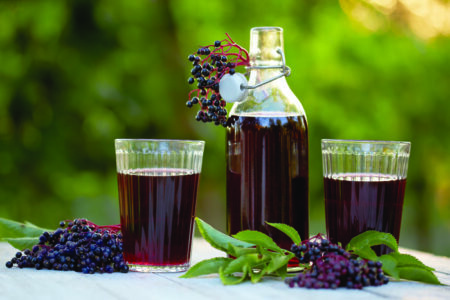
Ingredients
- 8 cups juice
- Sugar or honey (optional)
- 4 tablespoons lemon juice or
- 1 teaspoon citric acid
Directions
- Elderberry juice is very tart! Bring your juice to a boil, adding sugar or honey to taste, if desired.
- Prepare jars by washing well, and simmering the lids and rings.
- Prepare the water bath canner by placing a rack in the bottom and pouring in several quarts of hot water. Put 2 tablespoons white vinegar in the canner to keep your jars clean.
- Put 1 tablespoon lemon juice or 1/4 teaspoon citric acid in each jar.
- Fill each jar with hot juice to 1/4-inch headspace.
- Clean rims with vinegar-moistened cloth, place hot lids and rings, and finger-tighten.
- Place jars in canner and add water until jars are covered by 1 to 2 inches.
- Bring to a boil for 10 minutes.
- Turn off stove and allow to sit for 5 minutes. Remove jars and place on a towel for 16 to 24 hours.
- Label and store.
Foraging for or growing elderberry is simple in many climates. Learn how to cook elderberries safely and about the best method for canning elderberry juice.
Elderberries: A Wondrous and Wild Fruit
Elderberry. Some praise it; others caution against using it. But elderberry is full of antioxidants, minerals, and vitamins, and is a tasty addition to your apothecary and pantry.
Elderberry has been used by Native Americans for thousands of years. The berries are unsafe to consume raw but edible once cooked. You can freeze or dry elderberries or turn them into jelly, juice, or syrup.
Growing Elderberry
Growing elderberries is easy. First, dig up wild varieties or buy cultivars from reputable nurseries. The wild cultivars will probably be more resilient, as they’re already adapted to your specific climate, while the tame varieties will likely produce larger fruit. A few tame cultivars include ‘Johns,’ ‘Nova,’ and ‘Ranch.’ These have a wide range of compatible Zones, but always check your Zone before purchasing plants.
Elderberries can grow almost anywhere, from ditches to hills. They’re frost-hardy and can thrive in a wide range of temperatures. They also spread easily, so if you don’t want that, you’ll need to mulch around them or mow a few times a year. For proper pollination, plant multiple cultivars. The cultivars bear after 2 to 3 years, and berries can be harvested in August and September.
I encourage you to try getting out this year and foraging elderberries from the wild or growing elderberries on your own.
Preserving Elderberries: Drying and Freezing
You can gather elderberries from the wild or grow your own. In our area, they’re so prolific that we gather gallons of berries in late summer by clipping off wild clusters.
The easiest way to harvest the berries is freezing clipped clusters in large plastic bags. Then, gently hit the clusters over a large bowl or bucket, knocking off the berries. Alternately, you can gently comb them off with your fingers, but be prepared for purple stains!
Clean as much debris as possible from your berries, removing any stems, leaves, or green berries. Your berries can now be processed, dried, or frozen. To freeze, simply place cleaned berries into freezer bags or containers. Label and freeze for up to a year.
To dry, place on parchment paper and in a dehydrator or oven at 135 degrees Fahrenheit until thoroughly dried. Pinch to make certain they’re hard and no moisture remains. Store in bags or glass jars. Check intermittently for any moisture. If you find moisture, discard the berries due to bacterial risk.
How to Cook Elderberries for Juice

You can use a few methods to prepare elderberries for jelly, syrup, or juice. The easiest method is with a steam juicer or electric pressure cooker.
To use an electric pressure cooker, place 1 quart berries in 1 cup water and pressure cook for 10 minutes. Allow to decompress naturally. Then, purée. Strain the purée through cheesecloth or a mesh bag, and strain a second time if you still see tiny seeds.
You can also gently boil the berries (1 quart berries to 1 cup water) on the stovetop. Simmer until soft. Top with the lid and allow to sit for 1 hour. Purée and strain as needed.
To use a steam juicer, place your berries in the chamber, put water in the bottom, and process for 30 minutes.
The water bath method is best for canning elderberry juice.
To freeze the juice, place in freezer bags or containers, then label and freeze.
Elderberry Syrup Recipe
You can also make syrup by using 1 cup juice to 1 cup maple syrup or honey. Simmer gently for about 1 hour (don’t boil) until mixture reduces by half and is thick. Then refrigerate, freeze, or can by following the directions for juice.
Elderberry Safety: Can You Eat Elderberries Raw?
Please use caution to avoid cyanide toxicity. Only the flowers and ripe, cooked berries are edible; no other part of the elderberry plant is safe for human consumption. Boil or pressure cook berries for at least five minutes to reduce cyanide compounds.
More Recipes for How to Cook Elderberries
Resource for Growing Elderberries
River Hills Harvest
Elderberry plants and products
Info@RiverHillsHarvest.com
(579) 999-3034
Jenny Underwood is a home-schooling mama to four lively blessings. She makes her home in the rural foothills of the Ozark Mountains with her husband of 20 years. You can find her reading a good book, drinking coffee, and gardening on their little fifth-generation homestead. She blogs at Our Inconvenient Family.
Originally published as part of “Elderberries: A Wondrous and Wild Fruit” in the August/September 2023 issue of MOTHER EARTH NEWS magazine and regularly vetted for accuracy.






